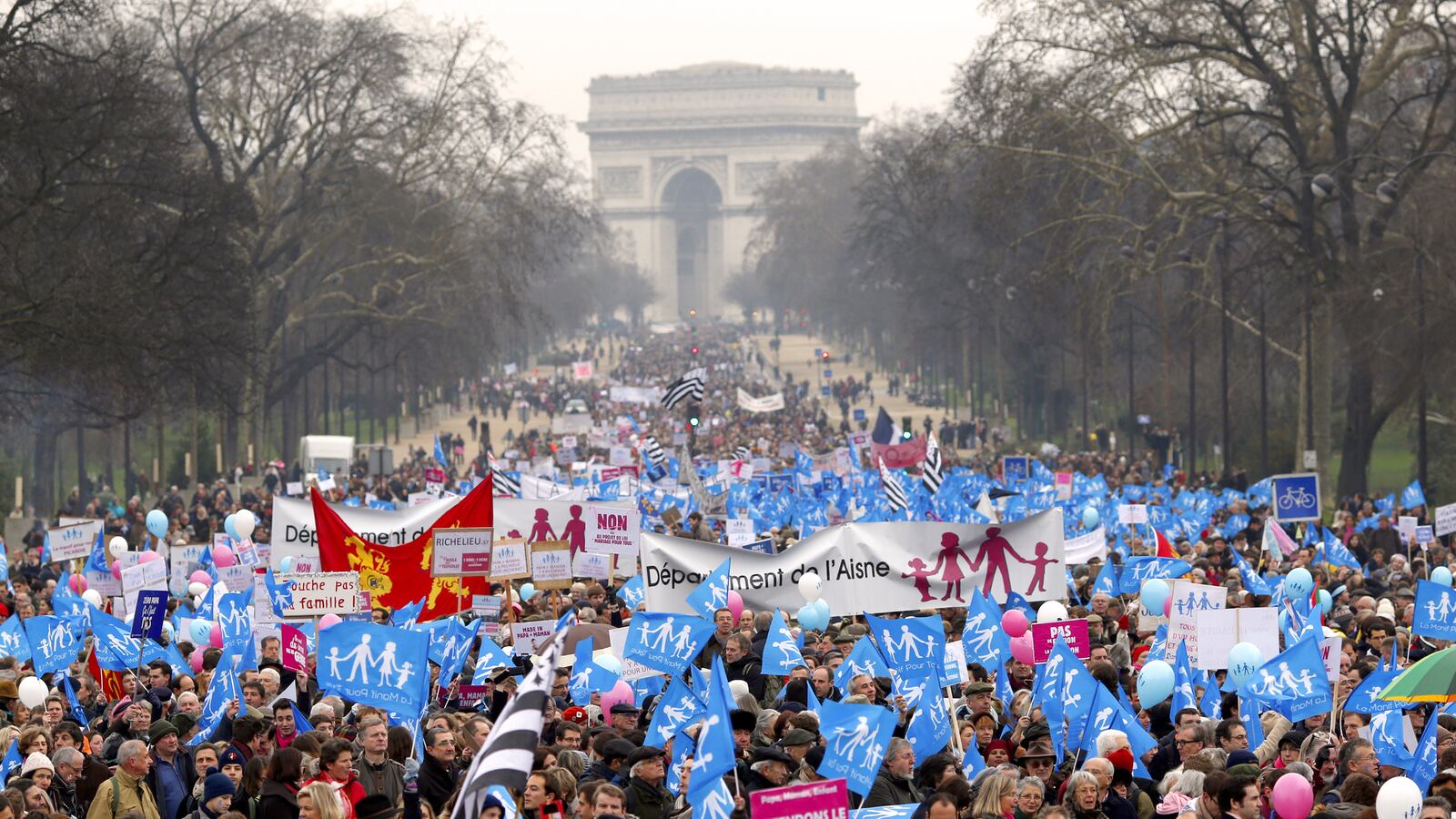Hundreds of thousands of conservative French protesters took to the streets in Paris to shout down France's gay-marriage bill. But Socialist President François Hollande's majority says the government won't back down. Now what?

Though bitter cold, the marchers came in droves. Sunday afternoon, three demo routes through Paris converged on the Champ de Mars, a grassy stretch—muddy from hundreds of thousands of feet and spitting rain—that splays east from the Eiffel Tower. The so-called Demonstration for All blasted Socialist President François Hollande's pending Marriage for All bill. Expected to pass before the summer, the plan is set to allow gay couples to marry and to adopt children. "All born from a man and a woman!" "No to mirage marriage!" the protest placards declared Sunday in Paris. "Daddy, Mommy, and the children, it's natural!"
Protesters from all over France made it a day trip to the capital and spilled from chartered buses parked in long domino lines along major Parisian arteries. Banners, flags, and balloons silkscreened with the silhouette of a cartoonish nuclear family holding hands—father, mother, boy, girl—pressed the message, bobbing and swaying with the crowd in waves of pastel blue for boys and pink for girls. One sign offered a crash course in sex ed: "There are no ova in testicles!"
French police estimated 340,000 protesters in Sunday's march. Organizers claimed it drew up to 1 million marchers. That wide gap in math is par for French demonstrations. But the conservative crowd wasn't quite the merry band of usual suspects at Paris marches, often largely leftist, heavily ritualized affairs. Here, seniors, some with walking sticks or canes, joined evidently large young families, fervently conservative students, even Catholic clergy—their vestments peeking out from thick winter coats—to hit the streets en masse, bolstered by right-wing and far-right elected officials draped in ceremonial French tricolor sashes.
Indeed, for Sunday's crowd of unseasoned protesters, much of the paraphernalia—thousands of placards, balloons, and T-shirts—were official issue, not least since organizers were keen to avoid any ad libbing that might be taken for homophobia. (Histrionics were not to be avoided entirely. Footage of Xavier Bongibault, a young anti-marriage, gay rights' group leader and one of the demo's designated spokesmen, became a fixture on 24-hour news channels when, with muddled logic, he likened Hollande to Adolf Hitler for ostensibly imposing marriage on homosexuals opposed to it.)
Recent polls show majority support for gay marriage in France—60 percent approved in a survey released last week by the IFOP polling firm—but only minority backing for adoption rights for gay couples (46 percent).
Polls however have been a major source of turmoil during France's bitter gay-marriage debate. Support for gay adoption, only 28 percent in 1998, as measured by the BVA polling firm, seemed to peak at 56 percent in 2011—just as François Hollande mounted his election bid. He won the presidency last May on a platform that included gay marriage and adoption in stark red lettering, promise No. 31 of 60 in his official campaign booklet. That clear election promise is often gay-marriage proponents' response to opposition politicians, like far-right leader Marine Le Pen, who demand the matter be settled by referendum. The presidential election was the referendum, Hollande backers argue.
A closer look at recent poll numbers suggests that a key source of the flagging support for gay marriage and adoption in France rests with supporters of the opposition Union for a Popular Movement, former president Nicolas Sarkozy's party, embroiled for months in a contested leadership battle. In only five months, UMP sympathizer support for gay marriage has plunged 13 points to 33 percent, and gay adoption 16 points to 22 percent. Seniors over 65, historically key UMP voters, are the only age group that remains opposed to gay marriage in the recent IFOP survey.
Last week, Socialist parliamentarians who had pledged to have medically assisted procreation for gay couples added to the gay-marriage and adoption bill yanked their amendment pledge, in a move seen by some as a concession amid the bluster. But the controversial measure is expected to return in a new bill on family issues in March. (For now, medically assisted procreation is limited to heterosexual couples—not individuals—and conditioned on medical grounds in France, although in practice French lesbians are known to turn to neighboring Belgium and Spain where the practice is legal.)
In the wake of Sunday's massive Paris protest, government spokeswoman Najat Vallaud-Belkacem on Monday told Europe 1 radio that the government would not be swayed, remaining "totally determined" to pass gay marriage and adoption into law. Debates on the lower house floor are scheduled for Jan. 29. Proponents of the bill are keen to show their support in Paris streets with a march to the emblematic Place de la Bastille two days earlier.
But after an impressive showing Sunday in the French capital, opponents of the bill are unlikely to let it go quietly. Indeed, although Hollande and his government have explicitly ruled out legalizing surrogacy, some protesters Sunday nevertheless brandished placards warning their wombs were "not shopping baskets" and "not for rent." As darkness fell Sunday on the Champ de Mars, one little girl, no more than 8, stood with her family, a poster affixed to her backpack that read, "I know where I come from. I ask myself where we're going." A sharp reminder that France's gay-rights proponents have more than a bill to stump for. They have a vividly imagined slippery slope to smooth out along the way.






